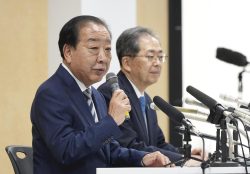Hard-to-Verify Information Spread during Hyogo Election Campaign; Contributed to Result in Saito’s Reelection

A large crowd gathers to listen to a speech by Motohiko Saito in Nishinomiya, Hyogo Prefecture, on Saturday.
17:55 JST, November 19, 2024
The spread of hard-to-verify information on social media contributed to Motohiko Saito’s successful reelection campaign in the Hyogo Prefecture gubernatorial election.
As governor, Saito had instructed his subordinates to identify a whistleblower who had reported internal allegations stating that he used his power to harass prefectural government officials. The prefecture then took disciplinary action against the whistleblower without waiting for the results of an investigation based on the whistleblowing system.
The Hyogo prefectural assembly, which condemned Saito’s actions, unanimously passed a motion of no-confidence vote against him, and he lost his job at the end of September. One of the points of contention in this election was supposed to be his suitability to be prefectural governor.
During his reelection campaign, Saito used X, formerly Twitter, to frequently promote his street speeches. About 400 volunteers were recruited by Saito’s supporters via the Line messaging app to help spread the videos on social media.
The number of followers of Saito’s X account was about 70,000 at the end of September and had grown to about three times that by the day of the vote on Sunday.
However, it was not Saito himself or his camp that had the biggest impact on the result, it was the messages sent out by third parties.
Takashi Tachibana, head the NHK Party political organization, has posted more than 100 videos on YouTube since the day that official campaigning for the election began.
According to a survey by the Net Communication Research Institute, a think tank specializing in social media analysis, the YouTube videos posted by Tachibana were viewed a total of nearly 15 million times, more than 10 times the number of views on Saito’s official channel.
Tachibana declared his candidacy in the gubernatorial election only to support Saito rather than to win the election himself, and uploaded information that has been difficult to verify.
Tachibana claimed that the male whistleblower, who died in July, had stored personal information unrelated to the internal accusations on his official computer, and that “he had committed suicide out of fear that the information would be discovered.”
With regard to the whistleblower allegations, Tachibana stated that they were “fabricated and defamatory.” He fueled distrust of the media among the public by saying, “I was also deceived by the mainstream media [regarding the issue].”
From midway through the campaign, Saito also gave speeches on the street, saying such things as: “Was the media really right? Everyone is looking things up on X and YouTube.”
Comments, such as one by 60-year-old woman from Himeji, who said, “I don’t believe what I see on TV or read in the newspapers,” show how support for Saito has snowballed.
There were also many posts on social media attacking opposing candidates. The runner-up, Kazumi Inamura, was forced to counter misinformation made about her campaign in her speeches. This included: “She promotes the right to vote for foreigners.”
In an exit poll conducted by The Yomiuri Shimbun on Sunday, 26% of respondents said they regarded “social media and video-sharing sites” as the most important information for voting, and just under 90% of those people supported Saito.
Saito received the most supported candidates among voters in their 50s and below, while Inamura was the most supported among voters aged 60 and above.
“Rather than the candidates’ qualities or policies, what people believed became the theme [of this election]. I began to wonder what I was facing,” Inamura said after the election.
“Momentum was gained from the spread of unverified information on social media, which portrayed Mr. Saito as a hero,” said Reitaku University Prof. Kazuhisa Kawakami, who specializes in political psychology.
“Mr. Tachibana’s decision not to aim for victory in the election was outside the expectations of the the Public Offices Election Law, which means that we need to discuss how to deal with such conduct in the future,” he said.
Top Articles in Politics
-

Japan PM Takaichi’s Cabinet Resigns en Masse
-

Sanae Takaichi Elected Prime Minister of Japan; Keeps All Cabinet Appointees from Previous Term
-

Japan’s Govt to Submit Road Map for Growth Strategy in March, PM Takaichi to Announce in Upcoming Policy Speech
-

LDP Wins Historic Landslide Victory
-

LDP Wins Landslide Victory, Secures Single-party Majority; Ruling Coalition with JIP Poised to Secure Over 300 seats (UPDATE 1)
JN ACCESS RANKING
-

Japan PM Takaichi’s Cabinet Resigns en Masse
-

Japan Institute to Use Domestic Commercial Optical Lattice Clock to Set Japan Standard Time
-

Israeli Ambassador to Japan Speaks about Japan’s Role in the Reconstruction of Gaza
-

Man Infected with Measles Reportedly Dined at Restaurant in Tokyo Station
-

Videos Plagiarized, Reposted with False Subtitles Claiming ‘Ryukyu Belongs to China’; Anti-China False Information Also Posted in Japan





















